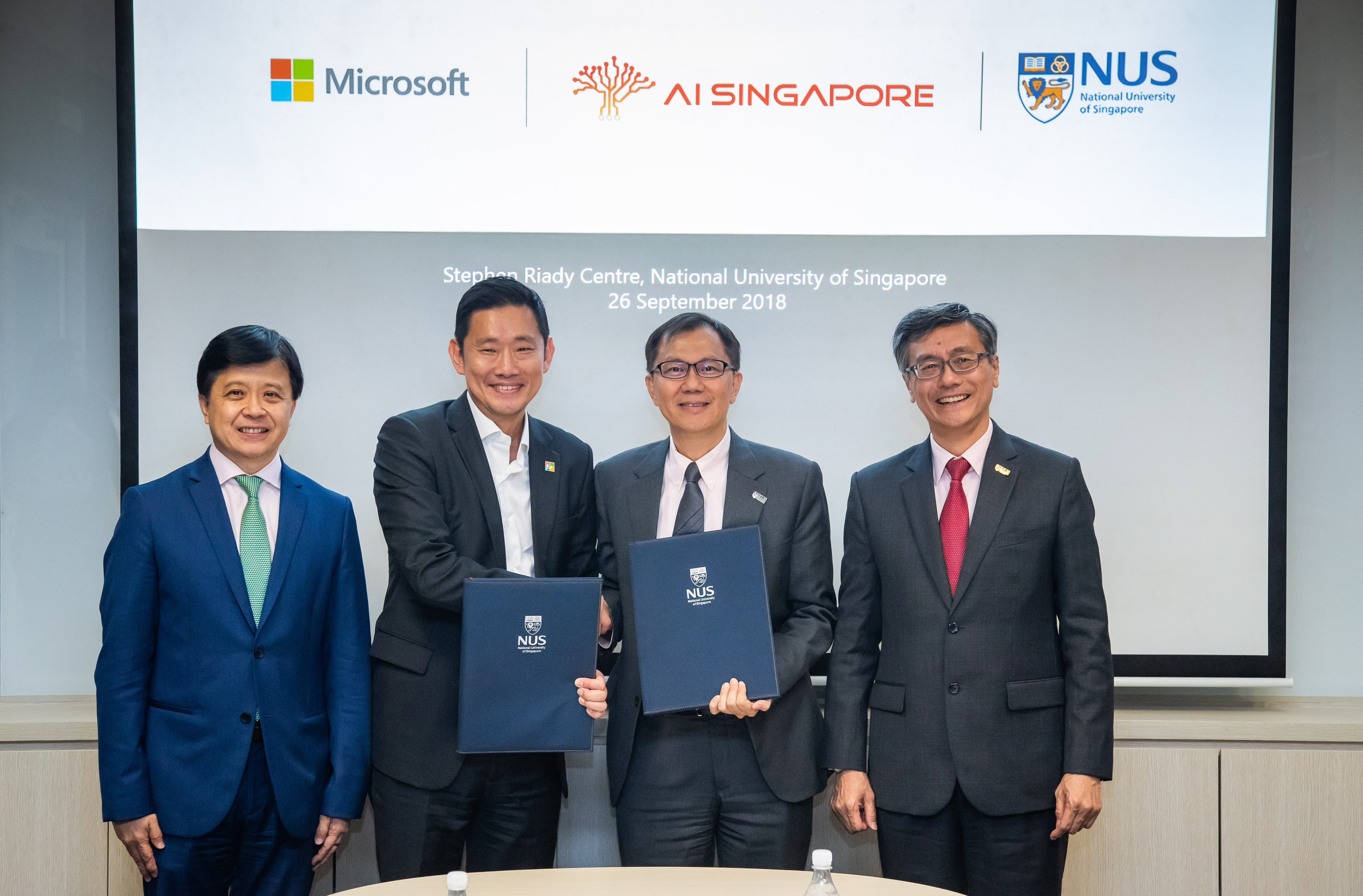SINGAPORE, 26 September 2018 – Today, Microsoft announced its collaborations with AI Singapore (AISG) to foster a greater aptitude in AI among Singapore’s workforce, and National University of Singapore (NUS) aimed at applying artificial intelligence (AI) to enhance research. The Memoranda of Understanding were signed during the Times Higher Education World Academic Summit 2018 held at NUS.
Professor Tan Eng Chye, President of the National University of Singapore, said: “This collaboration with Microsoft will accelerate our AI capabilities, empower our researchers and encourage innovation. We are thrilled to see how this cooperation can further improve our research productivity as well as boost our ability to develop and deliver better solutions to address the critical and complex issues that are relevant to Singapore, Asia and beyond.”
Professor Ho Teck Hua, Executive Chairman of AI Singapore added: “We believe that we have a responsibility to work together to upskill today’s professionals. Our collaboration with Microsoft will strengthen our efforts in AI education, upskilling and retraining in Singapore.”
In a recent study by IDC and Microsoft, “Unlocking the Digital Transformation Impact in Asia Pacific”[1], respondents in Singapore felt that 93% of jobs will be transformed in the next three years due to digital transformation, and 62% of the jobs in the market today will be redeployed to higher value roles or reskilled to meet the needs of the digital age.
Dr. Hon Hsiao Wuen, Corporate Vice President of Microsoft, Chairman of Microsoft’s Asia-Pacific R&D Group and Managing Director of Microsoft Research Asia said: “Microsoft is significantly invested in the democratisation of AI technologies. AI has great potential to augment the workforce, particularly in areas where there is a skills deficit. The higher learning institutions will be called upon to prepare the workforce with skills to be successful in new AI-related roles that are still yet to be invented. The collaboration is a step in equipping more individuals with the right skill sets so that they are able to participate meaningfully in the digital economy.”
The Study found that higher education business leaders in Asia Pacific are committed to invest in AI as the number one emerging technology for this year.
Upskilling Singapore’s Current and Future Workforce
The collaboration between Microsoft and AISG is established under the Microsoft-AISG Joint Innovation Program, a three-year initiative that focuses on upskilling Professionals, Managers, Executives and Technicians (PMETs) with AI expertise. The program also intends to develop AI-powered projects that will positively impact the society.
The three key programs detailed under this MoU are:
- AI Immersion Program aims to equip PMETs with new AI skills using the Microsoft Professional Program curriculum and provide support in placing them in new jobs through the AI for Real program.
- AI for Real intends to provide real-life, first-hand AI deployment experience and training to PMETs. They will help implement 100 AI pilot projects that run on the Azure platform across multiple organisation.
- AI for Research will have both organisations conduct a series of workshops on Microsoft’s AI for Good initiatives, which comprise AI for Earth and AI for Accessibility. This program will also identify socially beneficial projects powered by AI.
“Because the skills required for jobs in the AI economy are changing so rapidly, we need to ensure that our systems prepare, educate, train and retrain current and future workforce. The Microsoft AI Singapore Joint Innovation Program is designed to not only equip workers with AI skills, but also realise the potential of AI on the economy and society by having participants exercise their newly acquired AI skills on real-life projects,” said Kevin Wo, Managing Director of Microsoft Singapore. “As digital technologies such as AI are changing the nature of work and Singapore’s economy, Microsoft is making it our priority to help people and organisations ready ourselves for an AI-shaped future.”
Strengthening NUS Research Capabilities with AI and Machine Learning
To bolster its research and innovation capabilities, NUS will collaborate with Microsoft to harness the power of the Microsoft Academic Graph (MAG), hosted on Azure. MAG is an open and heterogeneous graph containing scientific publication records, citation relationships between those publications, as well as authors, institutions, journals, conferences, and fields of study. NUS aims to leverage MAG and AI technology to extract and analyse knowledge embedded in the publications’ data. In addition, researchers from the NUS School of Computing will use MAG to conduct healthcare-related research.
Through the power of AI and machine learning, MAG can infer query intent and retrieve the most knowledge while recommending new materials that are unbeknownst to the users. This solution will help the researchers address the chronic issue of information overload, streamline research processes and glean better insights.
In the Microsoft-IDC study, educators in the region highlighted that the top priority for 2018 would be to develop a culture of innovation and learning. To do so, institutions need to leverage data to drive transformative outcomes, which includes the ability to unlock limitless research capabilities in an agile manner.
[1] Unlocking the Economic Impact of Digital Transformation in Asia Pacific conducted with 1,560 respondents in 15 markets, including 166 from the education industry
- 15 Asia Pacific markets were involved: Australia, China, Hong Kong, Indonesia, India, Japan, Korea, Malaysia, New Zealand, Philippines, Singapore, Sri Lanka, Taiwan, Thailand, and Vietnam.
- Business and IT leaders from organizations with more than 250 staff were polled.
- Industries polled included education, financial services, government, healthcare, manufacturing, and retail.
- Respondents are decision makers involved in shaping their organizations’ digital strategy.

